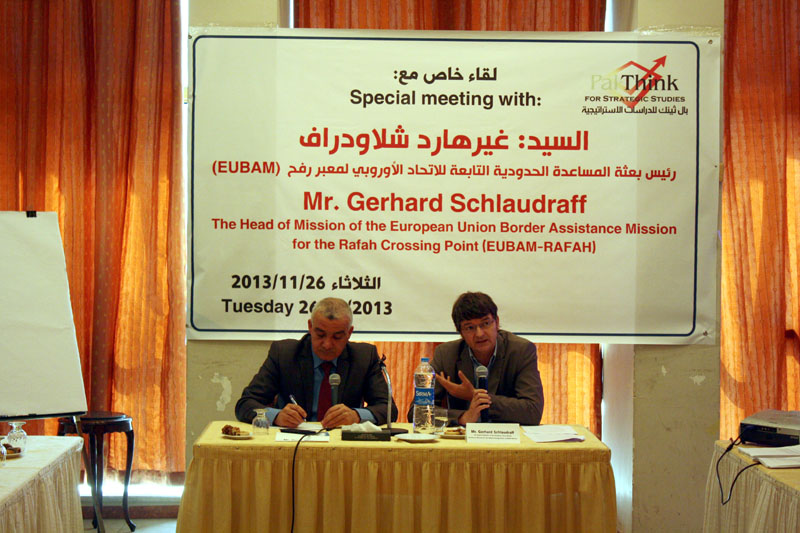Gaza (November 26th, 2013) – In a special event organized by Pal-Think for Strategic Studies, the new Head of Mission for EUBAM Rafah, Mr. Gerhard Schlaudraff stated that “it is possible for EUBAM to return to the Rafah Crossing, in full function, once an agreement is approached by all stakeholders”. In the meantime, he also assured that this return will not happen without the approval from Israel and the Palestinian Authority.
This important statement and along with many others, were delivered by Mr. Shchlaudraff to a number of distinguished figures from the Gazan society, that included members of Official and Legislative Authorities, representatives from civil society organizations and the private sector, and a small number of activists and border control specialists.
Mr. Shchlaudraff, a senior German diplomat, was previously a Political Advisor to the EU Special Representative for the Middle East Peace Process. He recently was appointed as the Head of EUBAM Rafah and this was his first visit to the Gaza Strip. In this regard, Mr. Schlaudraff was very glad to have the opportunity to meet with some Palestinian stakeholders, and discuss with them the current unpleasant developments in relation to the closure of the Rafah Crossing and the subsequent creation of inhuman conditions for Palestinians in the Gaza Strip. He also was eager to hear from the participants and warmly responded to their questions, suggestions, and concerns. He is also planning to present the results of this event to the next EU ambassadors’ meeting in Brussels, next week.
Mr. Schlaudraff began by giving a brief introduction of EUBAM and the exact mandate of EUBAM Rafah. He assured that EUBAM’s Rafah mission, unlike other EUBAM missions worldwide, does have an executive mandate. EUBAM Rafah was established to regulate movements of people in and out of the Gaza Strip, based on the 2005 Crossings Agreement with Israel. The agreement included the conditions and specifications for how the Rafah crossing had to operate. One of the conditions included the presence of international observers along with a live video feed to Israel, in order to be able to block anyone from leaving or entering the Gaza Strip, if need be.
Additionallu, Mr. Shchlaudraff repeatedly stated that the return of international observes to Rafah Crossing is not mandatory in any future agreements and would only be there when asked and agreed on. Nevertheless, he also ensured that bettering the movement and travelling conditions for the Palestinians through Rafah Crossing is among his main goals as a Head of EUBAM Rafah mission. Sadly, the internal Palestinian political disunity, along with the Israeli occupation has made it difficult to make any progress on the issue.
Nevertheless, according to Mr. Schlaudraff, the EU stands ready to reactivate EUBAM Rafah, once political and security conditions allow, in order ensuring the EU third party role at the Rafah crossing point. EUBAM Rafah will continue to ensure the mission’s readiness to return to the Rafah Crossing Point at short notice, and liaise with the parties on a regular basis.
From their side, participants from this event were pleased to have the chance of meeting with Mr. Schlaudraff, who was able to hear their concerns owing to the continuous closure of the Rafah Crossing. Furthermore, they also welcomed the idea of a EUBAM return without restricted by Israeli conditions. This means that, the 2005 Crossings Agreement can be reintroduced but, only to regulate work between the Palestinians and Egyptians.
In conclusion, a number of recommendations were provided as an attempt to find possible solutions. This included the following:
• Ending the internal political division is essential in order to unify the Palestinian position in all matters, including their position on how to manage the Rafah Crossing.
• If EUBAM is reintroduced, a solid strategy must be put in order to ensure the safety of international observers and thus ensure the proper functioning of their mission without any obstacles.
• If reconciliation is not achieved, EUBAM Rafah can still function by working with private sectors who can take responsibility of the Rafah Crossing upon agreement from governments in Gaza and Ramallah.
• EUBAM Rafah must include the idea of bettering people’s travelling conditions in the Gaza Strip as the mission’s main objective.
• NGOs and Civil Society organizations should double their efforts in providing alternative solutions and in creating pressure on both governments in Gaza and Ramallah in order to end the division


